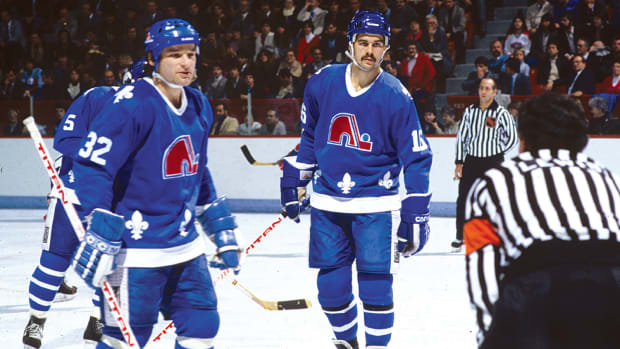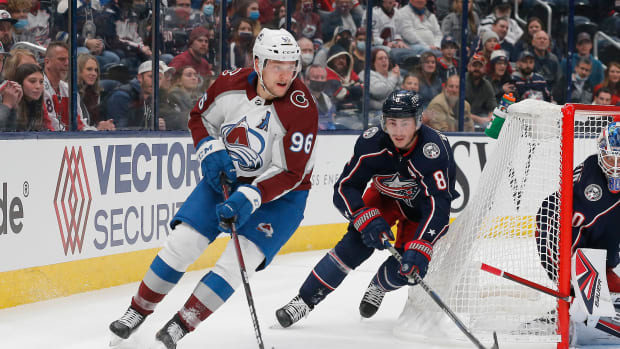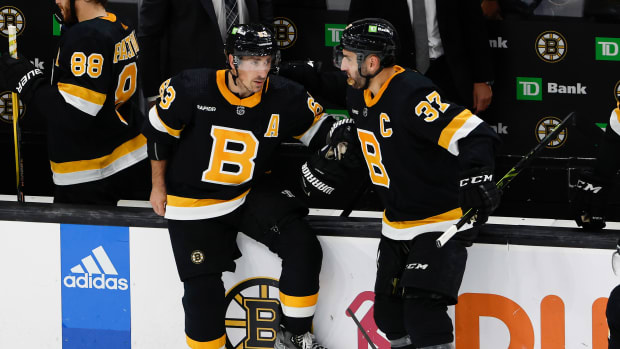While speaking to arena host Hannah Bernard during the first intermission of the Vancouver Canucks’ 8-5 win over the Anaheim Ducks on Thursday, Kevin Bieksa admitted that it felt pretty good being back out on the ice at Rogers Arena.
The 41-year-old looked pretty good out there too.
First, he suited up for Thursday’s morning skate.
At game time, he came out in full gear — although it was from his era, most noticeably with the word ‘Vancouver’ arced above the orca logo on his jersey.
Now a popular analyst on Hockey Night in Canada, as well as a youth hockey coach at his West Coast Academy in Southern California, Bieksa regaled the local media with quips and memories for 20 minutes on Thursday morning. As always, he effortlessly walked the fine lines between levity and sincerity, poking fun and earnestness, wisdom and entertainment.
He also spoke to the Canucks players Thursday morning, emphasizing that he didn’t want to coach them or lecture them while clearly aware of the 2-6-2 cloud enveloping the organization where he earned his stripes as an NHL player and logged his biggest career highlights, including the memorable double-overtime ‘Stanchion’ goal against the San Jose Sharks which sent Vancouver to the 2011 Stanley Cup final.
“We joke around about being an offensive defenseman,” Bieksa said Thursday. “I considered myself a complete defenseman for my whole career.
“I wanted to be good at every part of the game. I wanted to be physical, tough, block shots. But I also wanted to move the puck, be skilled. I wanted to be on the power play every year. I wanted to be on the penalty kill. So with that, I hope I could have played in any era.”
Could he still be playing today?
Born in June 1981, Bieksa is one month younger than the NHL’s current oldest player, goalie Craig Anderson of the Buffalo Sabres. He’s only a little more than two years older than Mark Giordano of the Toronto Maple Leafs. And he’s more than three years younger than Zdeno Chara was last season with the New York Islanders and six years younger than Chris Chelios was when he played his final season at age 47 in 2009-10.
So it’s not completely outside the realm of possibility. And viewers of Hockey Night in Canada every Saturday can see that Bieksa keeps himself in great shape. But we’ve also seen how breaks in training routines wreak havoc on older players in particular, who have frequently struggled to return to form after an NHL labour shutdown or even the schedule disruptions triggered by the pandemic.
Bieksa played his last NHL game on Apr. 14, 2018 — more than four years ago. He may have felt the itch on Thursday, but on top of having a fulfilling post-hockey life already in place, he’s smart enough to know that a return for him wouldn’t be the same as David Krejci returning to the Boston Bruins this season after spending a year playing in Europe.
It’s too bad, though. Vancouver could really use a defenseman like a peak Bieksa in the lineup.
Eleven games into the season, the Canucks have allowed an average of 4.09 goals against per game, fourth-worst in the NHL. Their penalty kill, which struggled last season, has gotten even worse and is dead last with just a 57.6 percent kill rate. They also rank in the bottom half of the league in shots allowed (32.8 per game) and expected goals share at 5-on-5, per Natural Stat Trick (48.05 percent).
After missing the playoffs last season, the Canucks’ new management group admitted openly that it wanted to upgrade the blue line. But when training camp opened, the faces were all the same.
Injuries have been an issue. Travis Dermott, acquired at the trade deadline last March, hasn’t played since suffering a concussion during the pre-season. Tucker Poolman, who was limited to just 40 games last year due to migraine issues, managed just three games before finding himself back on the injured list. And Quinn Hughes, the Canucks’ far-and-away top blueliner, just returned to the lineup this week after missing four games with a lower-body injury.
While shorthanded, Vancouver management added two new faces. Riley Stillman was in his fifth game as a Canuck when he suffered an undisclosed injury, but is now back in action. And Ethan Bear was acquired from the Carolina Hurricanes in a trade on Oct. 28. A puck-moving blueliner who plays the right side but hadn’t seen any game action this season, Bear has looked steady in his first two games as a Canuck and could become part of the solution.
But there’s still a long way to go, and it’s not an easy path to bushwhack. When the new-and-improved New Jersey Devils rolled through Vancouver on Tuesday, they showed that it is possible for an organization to successfully re-work its defensive structure over a couple of years, with positive results. Thursday’s opponent, the Anaheim Ducks, are last in the league in goals against and shots allowed. They’re still showing the scars from last spring’s trade deadline purge that saw Hampus Lindholm and Josh Manson leave town.
And even if Bieksa’s best playing days are behind him, he’s still a powerful motivator and teammate.
On Thursday, the Canucks didn’t score the first of their eight goals until there were 20 seconds left to play in the first period. But newcomer Dakota Joshua dropped the gloves with Nathan Beaulieu just 3:12 into the opening frame — the kind of tone-setting maneuver that Bieksa himself might have executed during a period of struggles, back in the day.
It’s just one game. And no coach is going to be thrilled with an 8-5 final score. But on a day that was all about memories of the best period in Canucks’ franchise history, it’s fitting that the club earned two points, the fans had something to cheer for and everybody went home happy.



